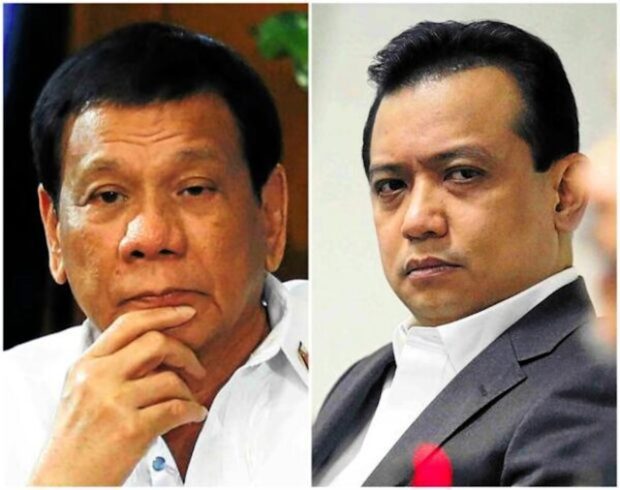SC declares Trillanes’ amnesty valid, strikes down Duterte’s revocation

Former President Rodrigo Duterte and former Sen. Antonio Trillanes IV. INQUIRER FILE PHOTO
MANILA, Philippines — The Supreme Court (SC) has declared valid the amnesty given to former Senator Antonio Trillanes IV as it ruled that the Proclamation issued by former President Rodrigo Duterte revoking it is unconstitutional.
In a statement issued by the SC’s Public Information Office (PIO), the decision, written by Associate Justice Maria Filomena D. Singh said the President cannot revoke a grant of amnesty without concurrence from Congress.
READ: Duterte revokes Trillanes amnesty, orders his arrest
READ: Duterte has sole power to void Trillanes’ amnesty – Panelo
The SC grounded its ruling on the primacy of the Bill of Rights and reaffirmed that neither the government nor any of its officials are above the law.
Trillanes was granted amnesty in 2010 through Proclamation No. 75 issued by then President Benigno Aquino III.
However, this was revoked in 2018 by Duterte through Proclamation 572.

‘Void ab initio’
Duterte declared ‘void ab initio’ (void from the beginning) the grant of amnesty to Trillanes for his supposed failure to file the official amnesty application form and expressly admit his guilt for the crimes he committed.
Through Duterte’s proclamation, the cases against Trillanes were revived.
This, the SC said is a violation of Trillanes’ constitutional rights against ex post facto laws and double jeopardy because the cases against him have been dismissed with finality.
READ: Trillanes, a free man for now: Makati court denies gov’t bid for his arrest
A law is ex post facto if it penalizes an act that is considered legal when it was committed or makes a crime greater or inflicts a harsher punishment than when it was committed.
An ex post facto law is prohibited under Section 22 of Article III of the 1987 Constitution.
On the other hand, double jeopardy, also prohibited under the Constitution, bars the prosecution of a person for the same offense twice.
Affirmed
The SC also affirmed the Court of Appeals and the Makati Court’s findings that Trillanes complied with all the conditions set under Proclamation 75, particularly the filing of an official amnesty application form and expressly admitting his guilt.
READ: CA affirms Trillanes’ amnesty as it rejects ‘Janus-faced’ gov’t position
“The Executive’s decision to revoke only Trillanes’ amnesty, notwithstanding the fact that the application forms of all the other amnesty grantees could similarly no longer be located, constituted a breach of his right to the equal protection of the laws,” the SC said.
Its decision, the SC said affirms that “in balancing the exercise of presidential prerogatives and the protection of the citizens’ rights, the Constitution and the laws remain as the Court’s anchor and rudder.”